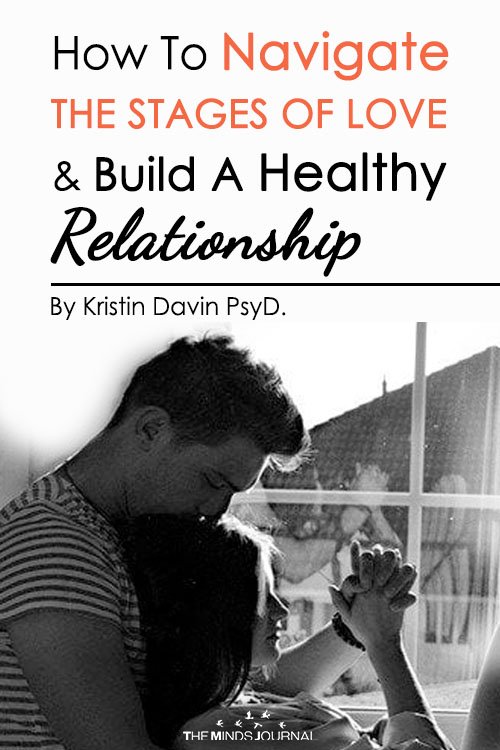Effort, intention, attention, looking at the long game, and HUMOR are key ingredients to a successful relationship. However, this can be easier said than done.
Couples that share an openness and willingness to traverse through the stages of love, despite the inherent ups and downs, will find themselves on the other side if they can weather the storms that often arise, even if it doesn’t feel that way at the moment. The honeymoon period will be here and gone before you know it and you will be left with the everyday stuff of life – that at first glance might seem boring but is actually an amazing thing. But, let’s not get ahead of ourselves.
1.) The Romantic Stage.
Feelings of bliss and happiness are universal and magnified with new relationships during this stage of love. People are thinking, ‘where have you been all my life!’ Your world – the world is simply wonderful. Differences are viewed as strengths. There is a great emphasis on similarities and sameness. We are fixated on this other person often to the exclusion of other things and people. We are obsessed. You forget about your limitations, fears, and inhibitions. You feel whole, connected, and loved! But, it’s easy to neglect other relationships and have the intense focus on your new partner. Tread carefully because an overly enmeshed relationship prevents maintenance of your own identity. For some, it can lead to codependency.
As time marches on, a shift in the relationship occurs. After months of going full speed at 80 mph, there is a shift. The brakes are put on. The effect of the ‘feel good’ neurotransmitter, Dopamine, has worn off and you find yourself less high on love. Reality sets in. Hello, power struggles!
2.) The Power Struggle Stage.
The rose-colored glasses have become a little less ‘rosy.’ The illusion that romantic love will last forever is often replaced with disappointment. A shift occurs from your similarities to differences. Behaviors that were once cute have become annoyances. People attempt to change their partner back to what they thought they were or what they created in their mind. It’s easy to create the person who we want this new person in our life to be rather who they actually are. It’s quite the quandary. Arguments and disagreements increase. Miscommunication occurs due to different communication styles. Many relationships cannot weather the storms. If you want to make your relationship survive, what will you do differently? Are you open to changes and learning how to communicate differently?
Each clash or power struggle makes you feel a little less hopeful about your future together and affects your sense of security in the relationship. This makes you feel out of balance, out of sync. Whereas once it felt good to be together, there is no uncertainty about what to expect from your partner. You are thinking – is this relationship doomed? Have I made a mistake? If couples are not careful, they can resort to punitive tactics such as guilt, shame, and fear – in their attempt to get their attention. Couples also blame the other for the relationship demise and want them to change.
During this process, work towards these things to prevent the relationship from ending:
• Accepting and appreciating your differences
• Learning to share power
• Relinquishing your fantasies of constant harmony
• Recognizing the strengths of your relationship.
• Setting and reinforcing clear boundaries and demonstrating mutual respect.
The goal of this stage is to establish your autonomy without destroying your love connection. Relationships gain strength if each person is able to manage their own feelings, handle disagreements amicably, and is open to improving and changing – if necessary – their communication styles.
This stage provides an opportunity for each person to dig a little deeper and discover what’s important to you and find ways to challenge yourself to continue to give in ways that further strengthen your relationship. When resolved in healthy ways, the conflicts that relationships endure help strengthen your emotional intimacy with each other.
The relationship becomes more realistic, rather than an idealized “fantasy.”
3.) The Stability Stage.
During this stage, a greater awareness of each other’s behaviors, differences, and annoyances emerge. Both have worked through establishing roles and independence and have moved away from the power struggles that once monopolized the relationship. They recognize that disagreements are just that – disagreements. They do not necessarily turn into arguments but if they do, they are manageable.
A relationship rhythm has developed, and each person experiences a greater feeling of relaxation. Trust and safety allowing each person to move away from the relationship in healthy ways without the relationship feeling threatened evolves. However, despite the positivity in the relationship, boredom lurks around the corner. This can lead to apathy or infidelity. Some people start to move away from rather than towards their partner. They might begin to ‘lean out’ of the relationship. Couples start to take one another for granted. There is less attention, intention, and investment in the relationship. Don’t allow this to happen. Talk about it. Recognize that this is part of the process and realize that boredom is part of the process but through deeper conversations, can be overcome.
4.) The Commitment Stage.
Clear choices about yourself and your partner are made. You have recognized both your and your partner’s shortcomings and accepted them. This is not a perfect science, but you are on a healthy path. There is an ebb and flow to the process. You trust more and feel safer. You remain curious. You can be yourself and do things that are important to you, but also stay connected with your partner and do things together. You have been able to manage the bad times and embrace the good times. Despite the bad, you can rise above and still enjoy the other’s company. This is a good place to be. You don’t need the person; rather, you choose to be with this person. There is a balance between power, freedom, love, and belonging.
Some questions people ask include: Can you see yourself with this person long term? Do you have shared interests and goals? Does this person add, not take away, from your life? Is this person the total package? Do you work as a team?
These questions are reminders that relationships always need continued work, attention, and commitment.
Key points in love to embrace:
• Communication is key. How will you communicate about your differences? How will they be managed? Can you talk about your differences in a way that encourages healthy communication strategies and understanding? In a way that honors both your similarities and differences? Do you feel safe sharing your feelings?
• Learning to recognize and embrace the stages of love can help both individuals and couples better navigate the expected twists and turns of a relationship.
• Understand and prepare for the challenges that relationships bring. This helps the couple identify the triggers and be proactive rather than reactive. Learn how to work through them. This helps create the bridge that connects, not the bridge that divides. Boredom can set in but you can still embrace it. Remain curious about the other person. Have fun.
• Navigating through the stages of love is not a linear process. Recognize that life is a series of transitions that can offset the calm and put the couple back in the power struggle stage. That’s ok.
• If you feel the relationship is taking a negative direction, before it’s too late, consult with a professional. Having a third party to help you navigate your relationship challenges could be the key to saving your relationship! There is much to be said about an impartial third party. They can and often do help.
Become a Contributor at The Minds Journal
We Want To Hear Your Story. Share your work,thoughts and writings and we will make sure, it reaches the world! Submit Now
Written by
Kristin M. Davin, Psy.D.
Solution Focused Psychologist & Coach
Originally appeared on KristinDavin.com
You may also like
- The 3 Stages Of Love You Must Go Through Before You Get Married
- The 5 Stages of Love: Why Too Many Stop at Stage 3
- The 7 Types of Love
- 9 Good Signs That You’re In The Right Relationship









Leave a Reply
You must be logged in to post a comment.